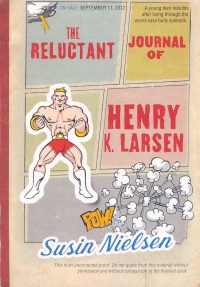| ________________
CM . . . . Volume XIX Number 5 . . . . October 5, 2012
excerpt:
Henry, 13, and his dad have just moved to Vancouver where they now live in a small apartment. Henry’s family is recovering from a horrific tragedy. Relentlessly bullied, Henry’s older brother Jesse shot and killed his tormentor before ending his own life. Henry’s mom is in psychiatric care, and his dad is exhausted, fragile and still cries a lot. The family is also in financial crisis. Henry has retreated emotionally and sees a therapist. He starts at a new school where, luckily, no one knows his story. He is befriended by the nerdiest kid in school – the kind of victim Henry is trying to avoid after what happened to his brother. But Farley won’t take no for an answer, and he and Henry actually develop a great friendship. Through Farley, Henry reluctantly joins the school’s Reach for the Top team. Henry tries to reunite his parents, plan a road trip to see his favourite wrestlers and stay a step ahead of bullies at his new school. This is an “issue” book, and teen bullying and violence are so often written about that yet another take on the subject should offer something innovative. But the extreme bullying angle is clunky and not well-integrated into the book, with the added hurdle that it happened in the past. The scenario just does not sit well with Nielsen’s strengths – understated humour and the travails of characters who are just a little bit offbeat. Concentrating on developing more of the plotlines and really bringing them together could have added depth and nuance, but, as it is, the book seems laboured and sometimes manipulative. This is also a story about grief and dealing with loss. In that respect, it is also competing with countless classics and fails to distinguish itself from the pack. Ostensibly this is Henry’s therapeutic journal, but this overused structure feels false here and adds little to the message or development of the story. Making use of a therapist/patient relationship as the basis for exploring teen issues is also overdone, and Nielsen probably could have cut out the therapist. Of all of the characters and plotlines, this one is the least effective and most predictable (therapist seems like a weird old hippie, but Henry comes to like and trust him). Such a device can still be used effectively, but the compelling reason is absent here. There are also some very fun, unique elements. Henry’s new friends are the nerdy Reach for the Top team, and this milieu is very well-created. But Henry’s love of trivia is underdeveloped and serves mostly to provide a believable peer group and a forum for success. It is also used in a very predictable way. As soon as Henry is invited to join the group, we know he’ll resist, then be charmed by the misfits and eventually find a place with them and a sense of self-worth. Better integrated is the Global Wrestling Federation, a TV wrestling show which was central entertainment for Henry’s family. It is a bit unconvincing that almost every other character Henry meets happens to also be obsessed with this show or starts watching it and becomes immediately obsessed. Henry’s favourite character is, of course, the underdog, and by describing Henry’s reactions to the wrestling plots, readers get more insight into his personality, hopes and fears. Henry freaks out a bit when his new friend, Farley, recounts his love for Vlad the Impaler – the wrestling villain. But Farley sees that sometimes drama is a good thing and that without good and evil there would be no show. However, readers can see that it might be nice for kids like Farley if there were no real-life Vlads to throw cans at their heads and stuff them in lockers. Obviously, Nielsen thinks bullying is bad, but her messages are mixed and confused. The perspective is deeply personal, but the book seems somewhat lacking in point-of-view. I loved the character of Alberta, a hip quirky girl who is a bit chubby and abrasive. She is expertly drawn, but I never quite believed her romantic interest in Henry. And I’m not sure this book needed a romance. It seems like Nielsen was throwing everything but the kitchen sink at this book to see which plot elements would stick. Farley is also a wonderful character, and Nielsen rounds him out to be more than just another Asian nerd. Farley lives alone in a mansion with his nanny, and, while Henry envies the lack of tragedy in his friend’s life, he also sees that all kids have challenges to overcome. Henry also develops quite neat and unconventional relationships with two adult characters who share his apartment building. While Henry initially pegs them as nosy neighbours, he finds that they do have something to offer. It’s a shame that The Reluctant Journal of Henry K. Larsen has so many flaws in plot and overall concept because Nielsen is a wonderful writer, smart, engaging, entertaining. She creates her characters with ease and never has trouble finding the humour in a situation. Her skill with words and flair for character makes this book worthwhile. Recommended with reservations. Kris Rothstein is a children’s book agent and reviewer in Vancouver, BC.
To comment
on this title or this review, send mail to cm@umanitoba.ca.
Copyright © the Manitoba Library Association. Reproduction for personal
use is permitted only if this copyright notice is maintained. Any
other reproduction is prohibited without permission.
NEXT REVIEW |
TABLE OF CONTENTS FOR THIS ISSUE
- October 5, 2012.
AUTHORS |
TITLES |
MEDIA REVIEWS |
PROFILES |
BACK ISSUES |
SEARCH |
CMARCHIVE |
HOME |
